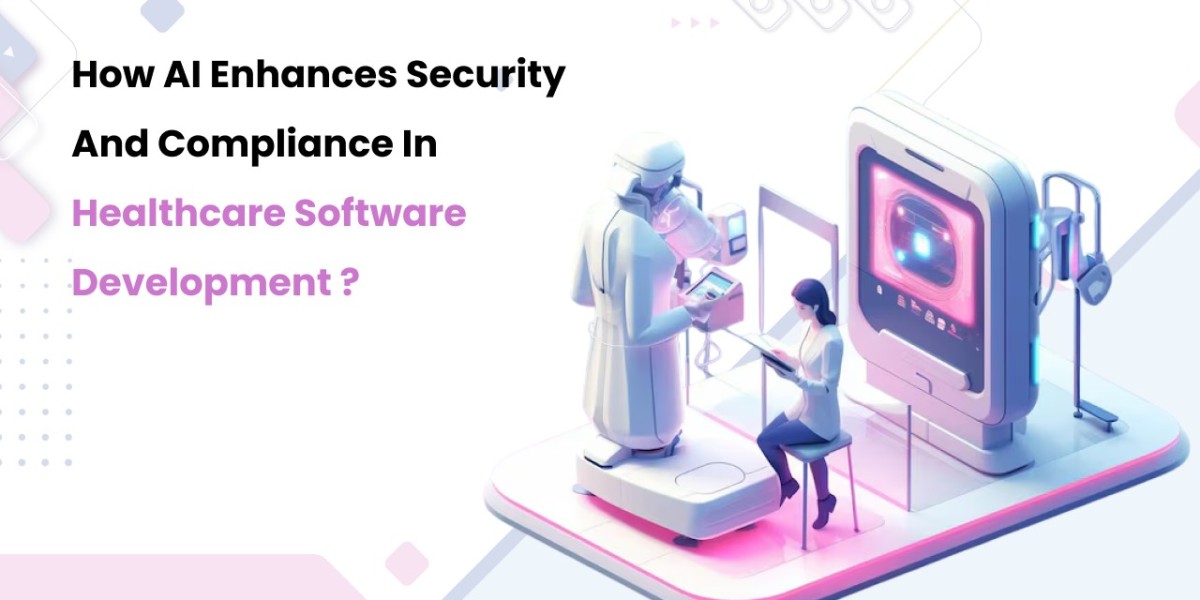In the increasingly digitized healthcare environment of our times, compliance and security are two extremely critical pillars of effective healthcare software development. With increasingly sensitive patient data and standards such as HIPAA increasingly getting tighter day by day, AI is the highly anticipated messiah that can turn secure and compliant healthcare solution development into reality. In Telemedicine Software Solutions or mHealth Software Solutions, the convergence of AI technology helps providers and developers make security and compliance more efficient and gain users' trust.
Artificial intelligence is becoming a strategic emerging resource for all health care software development firms with the benefits of lower human error rate, built-in risk detection, and continuous regulatory compliance. Let us learn how AI is the game-changer in taking the security and compliance factor to the next level in tailored health care software development.
1. AI-based threat detection for health care apps
Network traffic and user behavior are scanned by AI-enabled apps for anomalies, and potential cyberattacks or data breaches are alerted about. Rules-based security will not detect sophisticated attacks, but predictive analytics using AI will detect vulnerabilities before they reach hackers.
In a dedicated healthcare software development company, the applications of AI-powered security engines in real time within the applications provide pre-emptive security against ransomware, phishing, or insider attacks. The intelligent systems are a fundamental necessity in mHealth Software Solutions, where mobile endpoints are most vulnerable with heterogeneous security controls.
Also, as patient data is constantly in transit between platforms in Telemedicine Software Solutions, AI renders security non-reactive but responsive and pre-emptive.
2. AI-based healthcare compliance auditing
HIPAA, GDPR, and HITECH compliance regulation is something that is common to healthcare software development. Auditing human compliance is not only time-consuming but also a certain guarantee of missing hidden systemic vulnerabilities. AI does this in real-time by monitoring system logs, configuration, and user permissions all the time to detect violations.
Healthcare software development services can leverage AI to allow audit trails and real-time reporting of compliance. It is less expensive and time-consuming than doing it manually with systems that are continuously in regulatory compliance.
Healthcare software development services will be more willing to offer such AI capability on platforms so that they offer real-time compliance as the default feature, rather than an afterthought.
3. Intelligent data anonymization and access control
More and more patient information is being submitted for Clinical & healthcare management, research, and Healthcare Business Intelligence. It must be kept confidential. AI makes it possible to do smart anonymization of data—happily eliminating or encrypting personal identifiers without degrading data usability.
A data privacy center can be provided by an artificial intelligence-driven healthcare software development business through the support of analysis. Apart from this, AI can employ context-aware access controls, providing access solely where and when required.
It is most critical in cloud-based and remotely accessed personalized healthcare software development projects, where unwanted exposure will lead to costly legal fines.
4. Real-time monitoring and alerting feature development
An AI-process real-time system monitoring retains a history of system health, access activity, and anomalies. Real-time notification during health software development is able to identify illegal file transfer, suspicious user activity, or unintended configuration changes.
In Telemedicine Software Solutions, for example, if the AI system identifies login attempts from off-hour or an unknown location, the system immediately notifies or provides temporary denial of access.
This type of sophisticated monitoring system is an utmost requirement for all healthcare software development companies that aim to offer enterprise-class solutions with inherent resiliency and sensitivity.
Even those mHealth Software Solutions companies with a history of customized healthcare software development are incorporating AI-driven security dashboards to offer the administrators full end-to-end 360° visibility into threat status and compliance.
5. AI-based breach investigation and prevention
After a breach is identified, the response speed is critical. AI not only assists in analysis following a breach, but it can also recognize patterns that can prevent breaches from occurring. Adequate Healthcare Analytics by AI can potentially track down the data leak, unauthorized access, or control failure, non-compliance with its origin.
These analytics are increasingly being integrated into healthcare software development services since they entail historical review and predictive modeling.
A leading-edge health software development company integrates these capabilities into its underlying infrastructure in such a way that the end-users can see security KPIs, forecast vulnerabilities, and respond to real-time intelligence.
Conclusion: AI is the future of secure healthcare software
Security and compliance are a standard in health software development today. With the complexity of data and cyber attacks mounting, AI is the most viable choice as a compliance associate as well as a sentinel of sensitive information.
Being a healthcare software development firm developing from scratch or as an upgrade solution partner for health software development refacing outdated systems, adopting AI makes your solution securely compliant and scalable.
As the market is now moving towards advanced mHealth Software Solutions, Telemedicine Software Solutions, and Healthcare Business Intelligence solutions, the incorporation of AI in the development process no longer turns into a bright idea—although it should—the time has arrived when it needs to become a requirement.
Ultimately, AI no longer becomes augmenting healthcare software development—any more, it's transforming it.






